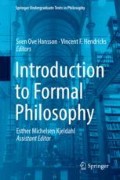Abstract
The word ‘concept’ is sometimes used as a synonym for ‘property’, but many authors use it in a more specific sense, for example as standing for unsaturated entities whose extensions are sets and classes, for Fregean senses, or for abstract objects. Although there is no universal agreement on a definition of concepts, a viable theory of concepts has to address a number of formal issues: How to deal with counterfactual and possibly contradictory concepts, how to restrict comprehension schemes in higher-order logic to avoid semantic paradoxes like the Paradox of Predication, how to nominalize concepts, and how to express similarity and typicality of concepts. The article gives a brief survey of the most important problems in concept theory and their possible solutions.
Access this chapter
Tax calculation will be finalised at checkout
Purchases are for personal use only
References and Recommended Readings
Asterisks (∗) indicate recommended readings.
*Andrews, P. B. (2002). An introduction to mathematical logic and type theory: To truth through proof. New York: Academic Press. [Contains an introduction to higher-order logic suitable for beginners].
Benzmüller, C., Brown, C. E., Siekmann, J., & Stratman, R. (Eds.). (2008). Reasoning in simple type theory (Studies in logic, Vol. 17). London: College Publications.
Burgess, J. P. (2005). Fixing Frege. Princeton: Princeton University Press.
Castañeda, H. -N. (1989). Thinking, language, experience. Minneapolis: University of Minnesota Press.
Cocchiarella, N. B. (1994). Philosophical perspectives on formal theories of predication. In F. Guenthner & D. Gabbay (Eds.), Handbook of philosophical logic (Vol. 4, pp. 253–326). Dordrecht: Kluwer.
*Cocchiarella, N. B. (2007). Formal ontology and conceptual realism (Synthese library, Vol. 339). Dordrecht: Springer. [Intermediate-level text that lays out fine-grained philosophical distinctions between systems of higher-order logic].
Ganter, B., & Wille, R. (1998). Formal concept analysis: Mathematical foundations. Berlin/Heiderlberg/New York: Springer.
Ganter, B., Stumme, G., & Wille, R. (Eds.). (2005). Formal concept analysis. Berlin/New York: Springer.
*Gärdenfors, P. (2004). Conceptual spaces: The geometry of thought. Cambridge, MA: MIT Press. [Reference work on the theory of conceptual spaces].
Henkin, L. (1950). Completeness in the theory of types. The Journal of Symbolic Logic, 15(2), 81–91.
Hintikka, J. (1955). Reductions in the theory of types. In K. Jaakko & J. Hintikka (Eds.), Two papers on symbolic logic (Acta philosophica fennica, Vol. 8, pp. 57–115). Helsinki: Soc. Philosophica.
Mormann, T. (1995). Trope sheaves: A topological ontology of tropes. Logic and Logical Philosophy, 3, 129–150.
Muskens, R. (2007). Intensional models for the theory of types. Journal of Symbolic Logic, 72(1), 98–118.
Parsons, T. (1980). Existence. New Haven: Yale University Press.
*Priest, G. (2005). Towards non-being: The logic and metaphysics of intentionality. Oxford: Clarendon. [Seminal recent work on non-existence].
Rapaport, W. J. (1978). Meinongian theories and a Russellian paradox. Noûs, 12(2), 153–180.
Shapiro, S. (1991). Foundations without foundationalism: A case for second-order logic. Oxford: Clarendon Press.
*Zalta, E. (1983). Abstract objects. Dordrecht/Boston/Lancaster: D. Reidel. [Older, yet important work on abstract object theory].
Author information
Authors and Affiliations
Corresponding author
Editor information
Editors and Affiliations
Rights and permissions
Copyright information
© 2018 Springer International Publishing AG, part of Springer Nature
About this chapter
Cite this chapter
Rast, E. (2018). Theory of Concepts. In: Hansson, S., Hendricks, V. (eds) Introduction to Formal Philosophy. Springer Undergraduate Texts in Philosophy. Springer, Cham. https://doi.org/10.1007/978-3-319-77434-3_10
Download citation
DOI: https://doi.org/10.1007/978-3-319-77434-3_10
Published:
Publisher Name: Springer, Cham
Print ISBN: 978-3-319-77433-6
Online ISBN: 978-3-319-77434-3
eBook Packages: Religion and PhilosophyPhilosophy and Religion (R0)

